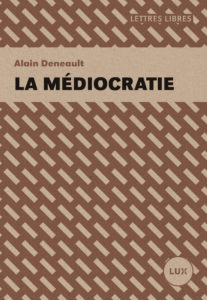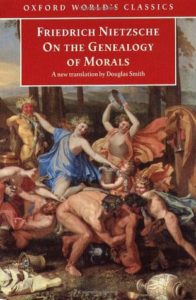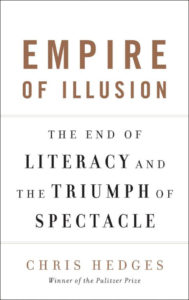La Médiocratie, by Alain Deneault

Deneault sets forth an indictment against oligarchy and oligarchs’ stranglehold on Universities, on the economy, on politics, on politicians and on culture. He denounces the corruption of universities and their research centres, which are financed by big companies in exchange for the training of an elite that will be “domesticated” according to the ideology fixed by companies; and in exchange for research studies that serve exclusively big companies’ interests. University, the author claims, has become a component of the financial, industrial and ideological contemporary machine, deploring that the students trained by corrupted teachers and universities are not taught to think for themselves and therefore become the mediocre elite of tomorrow, in charge of countries and big companies. The author also denounces the corruption of the economy, of the political system and of culture by the oligarchs. A MUST read.
On The Genealogy Of Morals, by Firedrich Nietzsche

Nietzsche questions the origin of morality and studies in which conditions has man invented the value judgement of good and bad and which core value do these value judgements hold. Have they inhibited or promoted man’s growth? Are they signs of distress, of impoverishment, of decline of Life? Or do they express the abundance and plenitude of Life, its courage, its hope, its future? The author finds that much of what we consider as good or bad, moral or immoral stems from religion and a desire from people “of God” such as priests, to dominate people who are mentally fragile, unstable. According to Nietzsche, priests’ desire to dominate others originates in a complex of weakness and powerlessness that leads to a desire of revenge against those who are powerful: wealthy people, successful people, and mentally and physically strong people.
The Immoralist, by André Gide

The novel tells the story of a man who had always lived according to strict principles, moral values and society’s standards until he became sick with tuberculosis and almost died. The road to recovery becomes a journey of self-discovery that leads the character to free his spirit from all strict moral sense that used to dictate his behavior. He gets to know himself and finds that true happiness means shedding the weight of society’s standards; quit taking a straight course of action and living in the present. He learns that any attachment to the past leads to unhappiness. Gide highlights the fact that society despises those who get off the beaten track although it secretly envies their courage and freedom. The immoralist also warns the readers on the danger of egoism in the quest of happiness and self-discovery, as it can run counter to its primary goal.
Deceit, Desire and The Novel, by René Girard

The author dives deep into the darkest and most intimate places of humans’ soul, explaining the genesis of desire, the origin of resentment, jealousy, envy, hatred and ultimately, unhappiness. Men are incapable of desiring by themselves. The object of desire, has to be suggested to them by a third party to whom is conferred a certain prestige. The desire that arises in a person is solely the imitation of someone else’s desire. The closer a person gets to the object of their desire, the stronger the rivalry with the mediator, who then becomes both a role model and an obstacle at the same time. Girard claims the imitation of a desire can only lead to resentment, jealousy, envy and hatred. He argues that jealousy stems from a tendency to compare oneself to another person and the propensity to systematically choose the other person’s attributes over one’s own.
Empire Of Illusion, by Chris Hedges

Hedges discusses the overthrow of real culture by the entertainment industry which strings are pulled by the world’s oligarchs, whose only goal is to dull the population’s mind with the flooding of useless TV and radio shows and pointless information so that the people does not question the real issues faced by the country, such as social, political and economic matters ; so that the people does not even possess the intellectual ability to have critical thinking on these issues. The world’s leaders, the CEO’s of the largest companies have managed to dictate social and political behaviors thanks to marketing, advertisement and the media; to the point where fame culture and sex culture which was initiated by pornography, are the only type of « culture » that are left.

